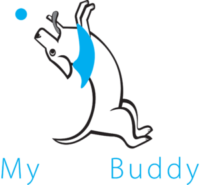Get In Touch
Contact us Anytime!
You are about to embark on a very important decision in your’s and your dog’s life! Here is a download of questions YOU should be asking as you interview for the position of Canine Life Coach.
Check out the frequently asked questions to the right.

Frequently Asked Questions
What does a Canine Life Coach Do?
- Teaches you how to build the canine-human bond.
- Gives you a better understanding of your dog and how he learns and communicates.
- Teaches you how to train your dog through evidence based methods proven by the science of how dogs learn.
- You will learn that it isn't about putting up with your dog; instead you will learn the tools to live in harmony, have fun, and be successful in your training.
Why don’t you use electric collars, choke chains or prong collars in your training?
At My Best Buddy we use science based, force free, positive reinforcement training. This means that we teach you to consistently reward the behaviors that you want from your dog, and manage or ignore (when possible) the behaviors that you don’t want. Because dogs will repeat behaviors that are rewarding to them, by using positive reinforcement, you can get your dog to voluntarily give you the behaviors you want, rather than forcing them. We don’t want you to risk damaging your relationship with your dog through the use of force and punishment, and we do not want to risk the physical harm that can occur with the use of punishment-based tools. Training is about relationship – our way of being with our dogs. Choke chains, e-collars and prong collars rely on pain to force compliance. You don’t have to hurt your dog to train him/her, so why use tools that, by definition, cause pain? Read about the tRade Program!
What should I bring to class?
- Proof of vaccinations. My Best Buddy Dog Training requires all dogs be current on vaccinations according to age for DHPP, Rabies and Bordatella. Vet records will need to be presented on the first day of class. We are aware of varying opinions regarding canine vaccinations. Certain exceptions will be made with written documentation from your veterinarian.
- Hungry dog. Feed your dog a smaller meal the night of class.
- Treats. We have treats, but you are welcome to bring your dog’s favorites, specifically, soft, pea-sized treats or ones that can be broken into small pieces.
- A standard (non-flexi) leash and a body harness. The harness that I recommend is The Freedom no-pull harness or a Roman style harness.
Do you offer private dog training in my home?
Yes! Behaviors addressed include: house-training, jumping, digging, chewing, destructiveness in general, fear, separation anxiety, and aggression. We rely 100% on reward-based methods instead of punishment for behavior modification and work to minimize the use of aversive stimuli. Private training is scheduled in one hour sessions in your home. See Private Instruction
What is your refund policy?
Refunds are not given after classes begin. Missing more than two classes will be considered dropping out. There are no refunds for missed classes. See Policies
What areas do you serve?
We serve Fayette, Coweta Counties and Fairburn, GA and charge no travel fees.
How early should a puppy start training?
The best time to start your puppy in training is around 9 weeks of age. They retain experiences really well at this age—a GREAT time for them to start learning! See Puppy Classes
My dog is older, can an old dog really be taught new tricks?
Absolutely! Older dogs may require a bit more patience and persistence to teach them new behaviors, but they certainly can learn! Finding what motivates your older dog is the key! When your older dog feels he is being rewarded for new behaviors, he will become keen to learn them. Rescue dogs are certainly a prime example of how you really can teach an old dog new tricks! See Recommendations for cool training tips and suggestions.
How do I decide whether to take group or private training?
Group classes are naturally very distracting for your dog and yourself, which is a disadvantage if your dog is hard to handle and easily distracted. Group classes are designed for dog and people friendly dogs. Group classes are a huge advantage for puppies who desperately need socialization at their early age. In a group class setting, you are responsible for the outcome, as the owner is the student in the group, and the dog is the student of the owner. Good students who work hard and do all of their homework will have success in a group dog training class. Private training is scheduled in one hour sessions in your home. Behaviors addressed include: house-training, jumping, digging, chewing, destructiveness in general, fear, separation anxiety, and aggression.
What about children in class?
We are unique in that we allow children to come to class and encourage families to particpate in puppy taining. We are also conscious of safety and have to enforce our rules for kids in class:
1. Children (ages 12 and under) require adult supervision, one adult per child (no children under the age of 5) (no exceptions);
2. Children must remain seated during the entire class unless the instructors ask them to participate;
3. The adults must hold the dog’s leash at all times (no exceptions).

Your Initial Phone Consultation is Complimentary
678-292-8960I want your and your dog’s training to be the right fit. Call or text.
So let’s get started!

Services

Free Advice

